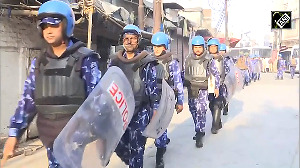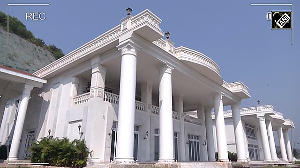Mohammed Ajmal Amir Kasab, the lone terrorist arrested in the November 26 terror attacks in Mumbai, was on Monday remanded to police custody till February 2 in the Chhatrapati Shivaji Terminus firing case.
Kasab has been in police custody since his arrest on the night of November 26 and has been booked in 12 cases by the city police.
He was last remanded in police custody on January 4 for his involvement with accomplice Ismail Khan in the shootout at the Cama and the Albless Hospital in south Mumbai.
Due to security concerns, Kasab was not produced in court today and Additional Metropolitan Magistrate N Shrimangale and Additional Public Prosecutor E B Dhamal were escorted to an undisclosed location, where the terrorist is being kept, for the hearing.
"It was argued that the police had to carry out further investigations in the case for which custody was needed," Dhamal said.
When asked by the court, Kasab said he had no complaints against the police, Dhamal said.
Kasab and his accomplice Ismail Khan had attacked CST on the night of November 26, killing 58 persons and injuring over 100 in the indiscriminate firing.
Meanwhile, Kasab has been remanded in judicial custody in four other cases.
The cases are the shootout at Girgaum Chowpatty, the ambush on a police vehicle near Rang Bhavan auditorium in which three senior police officials including Anti-Terrorism Squad chief Hemant Karkare were killed, the theft of a vehicle at Marine Drive and the shootout at Cama Hospital.
Kasab, allegedly a resident of Faridkot in Pakistan, has had no legal representation so far and has sought assistance from the Pakistani government.
He has so far not accepted legal assistance from local lawyers who have offered to represent him.
Over 180 persons were killed and over 300 injured in the attacks on November 26 by 10 terrorists at locations like the Chhatrapati Shivaji Terminus, Hotels Taj and Trident and Nariman House.
Nine of the terrorists who were involved in the attacks were killed in the subsequent operation by security forces.






 © 2025
© 2025